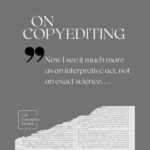 We’re sad to say goodbye to our hardy, super-duper volunteer Lisa Summe—who just graduated with an MA in creative writing from UC and is headed to Virginia Tech for an MFA in the fall. Our loss is their gain. The office won’t be the same without her brightly colored clothing, strong work ethic, and trenchant remarks on veggie burgers. (Which one tastes like a hockey puck? Which has the best blend of vegetables? How great is corn?)
We’re sad to say goodbye to our hardy, super-duper volunteer Lisa Summe—who just graduated with an MA in creative writing from UC and is headed to Virginia Tech for an MFA in the fall. Our loss is their gain. The office won’t be the same without her brightly colored clothing, strong work ethic, and trenchant remarks on veggie burgers. (Which one tastes like a hockey puck? Which has the best blend of vegetables? How great is corn?)
Before she goes, though, this future Hokie wanted to share one last thought: why she likes Erin Belieu’s poem “Olentangy River,” which appears in Issue 10.1, due out next month.
Lisa Summe: From the start of Erin Belieu’s “Olentangy River,” one is aware of the striking lack of punctuation. Ultimately, the poem is one long sentence broken up by a series of colons. More interesting than the absence of traditional punctuation, however, is the way Belieu uses spaces to effect separation and emphasis in a way that commas and semicolons cannot. These spaces slow the poem at all the right moments, turning it into a potent pile of little fragments, each one raw and deliberate, each one needing the weight Belieu confers on it.
The form beautifully enhances the poem’s content: the fragments convey the speaker’s desire for and obsession about a past love: ” you’ve never been imagined as / I imagined you: today with a wife sleeping / in Ohio and babies down the hall.” The self-awareness and vulnerability of this consciousness, together with universal longing and sadness conveyed in the poem’s details, drew me in. The speaker reminisces about nights driving past the former love’s house, nights the speaker calls inevitable because “there was you there / somewhere sleeping or toasting bread or / staring tired at TV and ending lost: always lost.” What are our old lovers doing without us? Regular things, perhaps, like making toast. Or not. How does our understanding of how they moved on vary from reality? We will never know.










